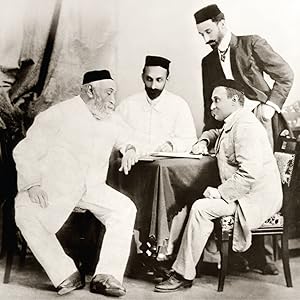

Jamsetji Tata: Powerful Learnings for Corporate Success
Introduction
Jamsetji Tata, an influential figure in the Indian industrial landscape, is often hailed as the "Father of Indian Industry." His pioneering vision and entrepreneurial spirit laid the foundation for the Tata Group, one of the largest conglomerates in India today. This review article examines the powerful learnings derived from Jamsetji Tata’s life, values, and business practices that can serve as a roadmap for corporate success in contemporary environments.
Visionary Leadership
1. Long-term Thinking
Jamsetji Tata believed in building enterprises that would serve future generations rather than merely focusing on immediate profits. His foresight in diversifying business interests—ranging from steel and hydroelectric power to education and hospitality—highlights the importance of a long-term vision. Companies today can learn from his approach by emphasizing sustainable growth and innovation over short-term gains.
2. Commitment to National Development
Tata’s vision extended beyond profit-making; he aimed to contribute to India’s economic and social development. His establishment of institutions such as the Indian Institute of Science illustrates how businesses can play a crucial role in nation-building. Corporations today should consider aligning their missions with societal needs, thereby cultivating a sense of purpose that resonates with employees and customers alike.
Ethical Values and Corporate Governance
3. Integrity and Transparency
Jamsetji Tata was known for his high ethical standards and transparency in business practices. His insistence on fairness not only garnered respect from his peers but also built a loyal customer base that valued integrity. Modern firms can take cues from Tata’s emphasis on ethical governance, ensuring that integrity is woven into their corporate culture. Effective whistleblower policies and transparent reporting mechanisms are practices that promote business ethics today.
4. Employee Welfare
One of Jamsetji Tata’s revolutionary contributions to corporate India was his belief in the welfare of employees. He implemented progressive policies, such as fair wages and working conditions, long before they became mainstream. His vision of a happy workforce is a crucial learning point for contemporary corporations looking to enhance employee motivation and productivity through positive workplace cultures.
Innovation and Adaptability
5. Embracing Change and Innovation
Jamsetji Tata demonstrated a willingness to embrace innovation, be it through investing in cutting-edge technology or exploring new business territories. His establishment of the Tata Steel plant in Jamshedpur was a monumental step that laid the groundwork for modern industry in India. In today’s rapidly changing business landscape, organizations should continuously adapt and innovate to stay competitive, fostering a culture that encourages creative problem-solving.
6. Strategic Risk-taking
A hallmark of Jamsetji Tata’s entrepreneurial journey was his ability to take calculated risks. He was not afraid to invest in large-scale projects or new industries, understanding that risk is an inherent part of growth. Contemporary companies can emulate this spirit by developing robust risk management strategies that weigh both potential rewards and setbacks, while fostering an appetite for intelligent risks among their leadership teams.
Legacy and Corporate Responsibility
7. Philanthropy and Corporate Social Responsibility (CSR)
Jamsetji Tata’s philanthropic efforts set the stage for the Tata Group’s ethos of corporate social responsibility. His belief that businesses should contribute to community welfare led to the founding of several trusts that work in various social sectors. Modern companies can draw inspiration from Tata’s legacy by integrating CSR into their business models, ensuring that corporate success is accompanied by a commitment to societal betterment.
8. Building a Sustainable Future
Finally, Jamsetji Tata’s focus on sustainability through the establishment of industries that rely on indigenous resources foreshadows today’s emphasis on sustainable development. Companies are now, more than ever, called to prioritize green practices and sustainable resource management. Tata’s model of long-term ecological accountability offers valuable insights for crafting sustainable business practices that can withstand the test of time.
Conclusion
Jamsetji Tata’s life and achievements provide rich lessons for businesses aiming for corporate success today. His visionary leadership, unwavering ethical standards, commitment to employee welfare, and emphasis on innovation serve as a blueprint for sustainable growth and corporate responsibility. As organizations navigate the complexities of the modern market, embracing Tata’s values can foster not only prosperous businesses but also a more equitable and sustainable world. His legacy reminds us that corporate success is not merely a question of profits but encompasses a broader commitment to society and the environment.
Price: ₹599 - ₹367.00
(as of Feb 15, 2025 17:22:57 UTC – Details)
Jamsetji Tata pioneered modern Indian industry. He has been a key catalyst in the economic growth and development of the country.
From Empress Mills to the Iron and Steel Plant, from the establishment of Indian Institue of Science to the building of the Taj Mahal Hotel, Jamsetji’s vision made India stand tall. In this carefully researched account, R Gopalakrishnan and Harish Bhat provide insights into the entrepreneurial principles of Jamsetji that helped create such a successful and enduring enterprise.
His contribution and that of his successors has led to the institutionalization of Tata values. Over the decades, through hard work, determination, and a consistent vision, he and his successors have embedded these values in the organization, which has stood the test of time and has consistently contributed to the country’s industrial development. The book takes readers into the heart of this amazing story and what has made it possible.
Interwoven with engaging real-life stories about iconic leaders of the Tata Group, and interesting anecdotes that went into the making of India’s popular brands such as Tata Tea, Tata Steel, Tata Motors and Tanishq, this unique account brings alive the vision of Jamsetji Tata and tells us what we can learn from it.
From the Publisher




Four partners: Jamsetji N. Tata, founder of the Tata Group; R.D. Tata, father of J.R.D Tata; Ratan Tata, younger son of the founder; & Dorab Tata, the elder son


J.R.D. Tata, the chairman of the Tata Group for over fifty years was also the founder of Tata Airlines, which later went on to become Air India.


Tata Memorial Hospital at Parel in Mumbai. Inaugurated in 1941, it is India’s first cancer care hospital.


Publisher : Penguin (31 July 2024); Penguin Random House India
Language : English
Hardcover : 256 pages
ISBN-10 : 0670098078
ISBN-13 : 978-0670098071
Item Weight : 200 g
Dimensions : 14.27 x 2.67 x 21.77 cm
Country of Origin : India
Net Quantity : 1 Piece
Packer : Penguin Random House India
Generic Name : Book










